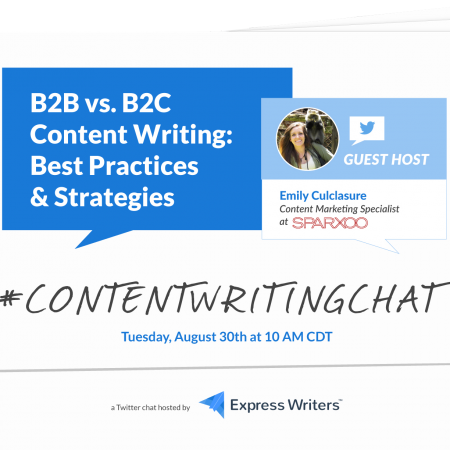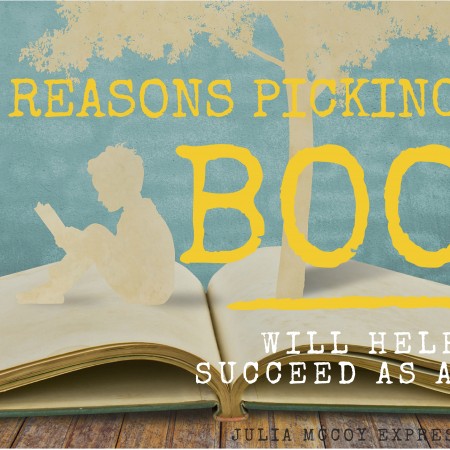#ContentWritingChat Recap: Getting Into a Writing Schedule with Kelsey Jones
As content creators, getting into a writing schedule helps us to stay organized and keep on track when it comes to our work. But how exactly do you create a writing schedule that works for you? That’s what we talked about in this #ContentWritingChat! If you need a content creation schedule of your very own, this is the chat for you! Keep reading for some helpful tips! #ContentWritingChat Recap: Getting Into a Writing Schedule with Kelsey Jones Join us for #ContentWritingChat on Tuesday, May 23rd at 10 AM Central with @wonderwall7! pic.twitter.com/gY1XKyLjtn — Express Writers (@ExpWriters) May 16, 2017 Our guest host for this week’s chat was Kelsey Jones. Kelsey is a marketing consultant, as well as a writer and the creator of MoxieDot. She knows how important it is to set a schedule and stick to it if you want to see results, so she shared tons of helpful advice with everyone in Tuesday’s chat! Q1: What is the importance of having a writing schedule? How can it benefit content creators? Not convinced you really need to have a writing schedule of your very own? We asked our chat participants to share why they think it’s important and how it can be beneficial. Check out what some of them had to say: @writingchat A schedule ensures that I write. As a biz owner( @storyshout @moxiedot_), writing for my own biz often isn’t priority :/ #contentwritingchat — Kelsey Jones (@wonderwall7) May 23, 2017 Kelsey knows that having a schedule ensures she actually makes time for writing. A1 A writing schedule sets the discipline of getting #content done. Otherwise, you risk procrastinating & not finishing. #ContentWritingChat — Julia McCoy ? (@JuliaEMcCoy) May 23, 2017 A1b Just don’t rush yourself and over schedule. ALWAYS allow time for inspiration. 1 amazing post > 10 crappy ones. #ContentWritingChat pic.twitter.com/ePNSbLHk6A — Julia McCoy ? (@JuliaEMcCoy) May 23, 2017 Julia knows that having a schedule and sticking to it is going to give you the discipline you need to get your content creation done. Without a set schedule, you risk procrastinating on your work and possibly not even finishing it. She also reminds us that we shouldn’t fall into the trap of over scheduling. Julia said to allow time for inspiration to strike. And remember that one amazing post will always beat 10 crappy posts. A1 Having a content writing schedule keeps self-imposed pressure on yourself to produce. #contentwritingchat — Jim Katzaman (@JKatzaman) May 23, 2017 Think of having a writing schedule as your own deadline. As Jim said, it adds a little pressure to give you that motivation to produce new content. Sometimes you need that to actually create something new. @writingchat A1: If you rely inspiration FIRST and only, you’ll never write. Schedules keep us productive and accountable. #ContentWritingChat pic.twitter.com/G61p3x8bbj — Shawn Paul Wood (@ShawnPaulWood) May 23, 2017 Having a schedule will ensure you’re staying productive and it holds you accountable. You don’t want to miss those deadlines you gave yourself, now do you? A1a: It gives a level of accountability, forward planning, and consistency to production and strategic thinking. #ContentWritingChat — Ray Sidney-Smith (@w3consulting) May 23, 2017 Accountability, forward planning, and consistency are just a few reasons having a schedule can be beneficial to you. A1 The importance of having a writing schedule is to keep you updated on what needs to be done. Holds you accountable. #contentwritingchat pic.twitter.com/eKDib2H3Nv — Tony Stephan (@OmnipoTony) May 23, 2017 When you’ve laid out a plan, you’ll always know what needs to be done and when it needs to be done by. This is going to be crucial in helping you stay on track with your content creation. A1: Consistency and scheduling can help combat procrastination in writing. At least it does for me. #ContentWritingChat pic.twitter.com/41eR7Ebhb6 — Rogue Jess (@JessOB1kenobi) May 23, 2017 Jess said that consistency and scheduling help her beat procrastination when it comes to writing. If you find you often procrastinate on writing, try setting a schedule and seeing if it helps you out. A1 A writing schedule keeps your purpose ahead of your pencil. No need to ask “what to write” with a strategy & schedule #contentwritingchat — Bill Skowronski (@BillSkowronski) May 23, 2017 As Bill said, there’s no need to wonder what you should write when you have a schedule and a strategy in place. Q2: When writing content, do you have a specific process you follow? If so, share it with us! How do you successfully write a piece of content? We asked everyone to share their processes with us, so take a look at what they had to say: @ExpWriters A2 I brainstorm topics, then write headers, then flush out. Doing headers 1st always helps! #contentwritingchat — Kelsey Jones (@wonderwall7) May 23, 2017 @ExpWriters A2 some of my fav tools for ideation: @BuzzSumo @ubersuggest @answerthepublic @Quora & Twitter hashtags in my industry! #contentwritingchat — Kelsey Jones (@wonderwall7) May 23, 2017 Kelsey starts by brainstorming topic ideas. She then likes to write headers and then begins creating her content. She even shared some of her favorite tools for coming up with great ideas. @ExpWriters A2 Absolutely! Attached is a screenshot of my key 5-step process, from ideation to creation, for @ExpWriters content. #ContentWritingChat pic.twitter.com/XwUXAUye4Y — Julia McCoy ? (@JuliaEMcCoy) May 23, 2017 Julia shared the five-step process that’s used to create content here at Express Writers. Do you follow similar steps? A2: Start w/idea, jot down all thoughts, perform research where needed, flesh out post. Walk away, proof. Publish.#ContentWritingChat https://t.co/PEoplJlHGY — ThinkSEM (@ThinkSEM) May 23, 2017 Once you have an idea, jot down your thoughts, perform research, and then flesh out your post. Take some time away before coming back to proofread it. Once you’ve finished editing, you’re ready to hit publish! @ExpWriters A2: Choose topic, sketch out rough draft, pick visual/video links, write body, revise, edit, enhance, polish. #contentwritingchat — Jeremy Murphy (@jeremypmurphy) May 23, 2017 Once Jeremy has written his first draft, he selects visuals, writes some more, … Read more









